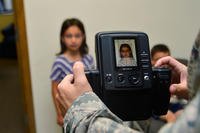Everyone knows the benefits of joining the military are pretty good, but for those who go above and beyond the call of duty, they are even better.
Earning the Medal of Honor is not an easy thing to do. Many of them have been awarded posthumously, and even troops who do something worthy of the medal can find their recommendation lost in an overly political process. Those who do receive it are rightly honored by military members and civilians alike.
On Military.com's podcast Left of Boom, Managing Editor Hope Hodge Seck talked to Kyle White for a personal view of what it's like to be one of only 69 living recipients of the United States' highest military honor.
White spoke about the increased level of public attention that comes with the medal, along with the work he's now doing to help struggling veterans.
Along with the fame of being placed on the Medal of Honor Roll and having American troops in uniform saluting them regardless of rank, there are certain other benefits bestowed upon recipients of the medal. While earning the Medal of Honor requires the risk of life above and beyond the call of duty, U.S. law affords special privileges to these honored few.
1. A Monthly Pension and Special Retirement Pay
As of Dec. 1, 2020, Medal of Honor recipients receive a $1,406.73 monthly pension with annual cost-of-living increases in line with the Social Security Administration's increases. This comes on top of any disability or retirement pay. Enlisted military retirees who receive the medal also get a 10% increase in retirement pay.
2. Uniform Allowances
The Department of Veterans Affairs' uniform allowance is intended to cover any damage to clothing caused by the member's service-connected medical condition or treatment. Enlisted Medal of Honor recipients also receive a supplemental uniform allowance on top of any uniform allowances they receive from the VA..
3. On-Base Parking Spots
In addition to lifetime access to on-base privileges such as commissaries, exchanges and Morale Recreation and Welfare facilities for the recipient and their families, they also get primo parking spots when they visit. Their identification cards reflect their status as Medal of Honor recipients.
While many veterans can now use some of these facilities, earning the Medal of Honor gets you access to the base gym and pool, along with other areas regular veterans can't access.
4. Priority Space-A Travel
The same free travel opportunity afforded on military flights for active-duty military members, retirees and their families is also provided to Medal of Honor recipients. But those who received the medal get priority access, ensuring they are more likely to get on the flight -- and they can take any flight with extra space.
5. Invitations to Presidential Inaugurals
Though not explicit in U.S. law, all Medal of Honor recipients are invited to attend every presidential inauguration. The invitation comes through the Congressional Medal of Honor Society, which also foots the bill for their trips to Washington.
6. Academy Appointments for Dependents
The same U.S. Code that gives dependents lifetime access to on-base facilities also exempts them from quotas mandated for the Air Force Academy, Naval Academy and U.S. Military Academy. Any qualified dependent can receive an appointment to these schools.
7. A Medal of Honor Flag
A special, gold-fringed flag that recreates the distinctive Medal of Honor design -- 13 white stars on a powder blue background -- is presented to each recipient or to their surviving loved ones.
8. Full Military Burial Honors
U.S. law affords a deceased Medal of Honor recipient the same burial honors as a military member who is killed on active duty. This includes headstone, six military pallbearers, a bugler, chaplain and an officer in charge, along with eligibility for burial in Arlington National Cemetery.
Until 2020, the provision for interment at Arlington did not include enlisted recipients of the medal. Under the 2020 National Defense Authorization Act, all Medal of Honor recipients are now eligible for burial with full military honors.
For more about what life is like for a Medal of Honor recipient, listen to Kyle White's complete interview on Military.com, and tune in to new episodes of Military.com's "Left of Boom" podcast on iTunes, Google Podcasts, Spotify, TuneIn and Stitcher.
Follow host Hope Hodge Seck on Twitter @HopeSeck.
-- Blake Stilwell can be reached at blake.stilwell@military.com. He can also be found on Twitter @blakestilwell or on Facebook.
Want to Learn More About Military Life?
Whether you're thinking of joining the military, looking for post-military careers or keeping up with military life and benefits, Military.com has you covered. Subscribe to Military.com to have military news, updates and resources delivered directly to your inbox.






















